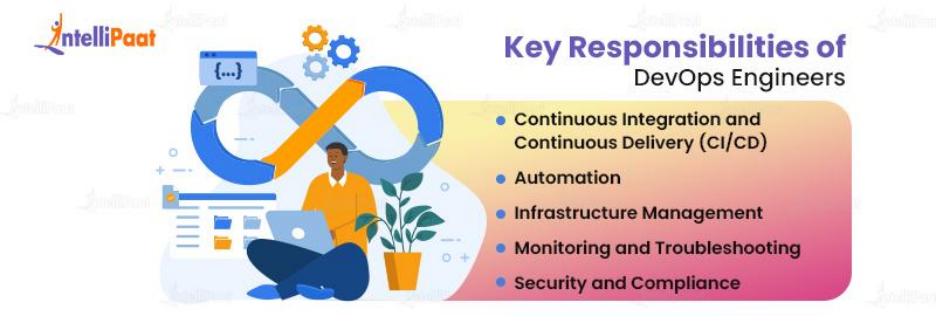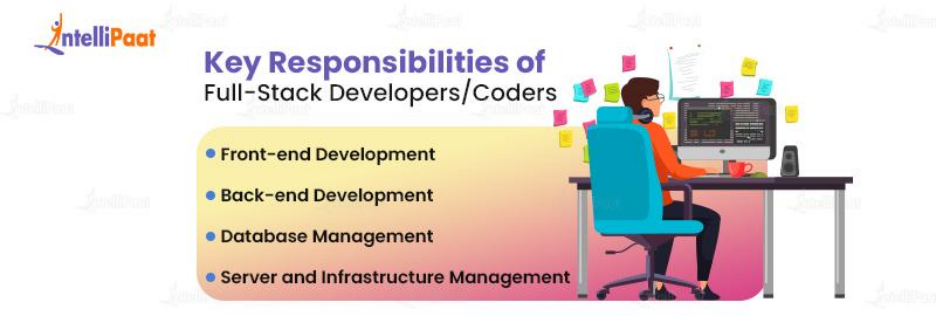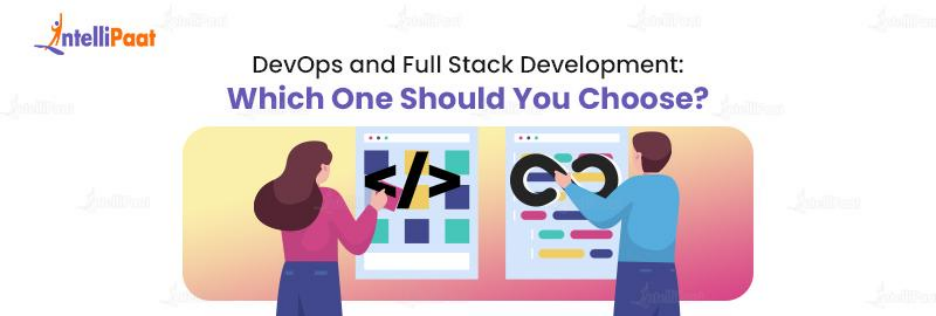DevOps Vs. Full Stack Developer: Which is Better?
In this blog, we will delve into the differences between DevOps and Full Stack development, exploring their key responsibilities, the skills required, and the advantages they bring to the table. By the end, you will have a clearer understanding of which role might be a better fit for you.
Table of Contents
- Who are DevOps Engineers?
- Who are Full Stack Developers?
- DevOps Vs. Full Stack Developer: Differences
- DevOps and Full Stack Development: Which One Should You Choose?
- Conclusion
Check out this video by Intellipaat on Becoming a Full Stack Web Developer and get started on your journey:
{
“@context”: “https://schema.org”,
“@type”: “VideoObject”,
“name”: “Full Stack Web Development Course 2023 | Full Stack Developer Course | Intellipaat”,
“description”: “DevOps Vs. Full Stack Developer: Which is Better?”,
“thumbnailUrl”: “https://img.youtube.com/vi/b92T8aCOwS0/hqdefault.jpg”,
“uploadDate”: “2023-07-18T08:00:00+08:00”,
“publisher”: {
“@type”: “Organization”,
“name”: “Intellipaat Software Solutions Pvt Ltd”,
“logo”: {
“@type”: “ImageObject”,
“url”: “https://intellipaat.com/blog/wp-content/themes/intellipaat-blog-new/images/logo.png”,
“width”: 124,
“height”: 43
}
},
“embedUrl”: “https://www.youtube.com/embed/b92T8aCOwS0”
}
Who are DevOps Engineers?
DevOps Engineers actively contribute to the software development process by connecting development, operations, and quality assurance teams. They implement collaborative practices and tools, automate processes, and ensure smooth software delivery. Their skill set encompasses software development, system administration, and infrastructure management expertise.
Key Responsibilities of DevOps Engineers

DevOps Engineers have a wide range of responsibilities that contribute to the overall efficiency and effectiveness of the software development lifecycle. Some key responsibilities include:
- Continuous Integration and Continuous Delivery (CI/CD): DevOps Engineers implement and maintain CI/CD pipelines, automating the integration of code changes, the execution of tests, and the deployment of software to production environments. They ensure a faster and more reliable software delivery process.
- Automation: DevOps Engineers automate various aspects of the software development process, including infrastructure provisioning, configuration management, and application deployment. They use tools like Ansible, Puppet, or Chef to streamline these processes, reducing manual effort and minimizing the risk of human error.
- Infrastructure Management: DevOps Engineers manage the infrastructure required for software development and deployment. They work with cloud platforms like Microsoft Azure, Amazon Web Services (AWS), or Google Cloud Platform (GCP) to provision and configure servers, storage, and networking resources. They also ensure the scalability, high availability, and security of the infrastructure.
- Monitoring and Troubleshooting: DevOps Engineers monitor the performance, availability, and scalability of software applications. They set up monitoring tools, analyze metrics and logs, and proactively identify and resolve issues. By closely monitoring the system, they can ensure optimal performance and address any potential bottlenecks or failures promptly.
- Security and Compliance: DevOps Engineers actively contribute to the security and compliance of software applications. They enforce security measures and best practices during the development process, perform vulnerability assessments, and guarantee adherence to industry standards and regulations. They work alongside security teams to detect and resolve security vulnerabilities or risks.
Enroll in this Full Stack Developer Course and start your journey now!
Who are Full Stack Developers?
Full Stack Developers are professionals who possess a diverse skill set and are capable of working on both the front-end and back-end aspects of web application development. They are well-versed in various programming languages, frameworks, databases, and server configurations. Their ability to handle multiple layers of software development makes them a valuable asset in the industry.
Key Responsibilities of Full-Stack Developers/Coders

Full Stack Developers have a broad range of responsibilities that span across different stages of the software development process. Here are some key areas where they play a significant role:
- Front-end Development: Full Stack Developers actively create the user interface (UI) and user experience (UX) of web applications. They employ technologies like HTML, CSS, and JavaScript to design and execute visually appealing and interactive interfaces. Their proficiency in front-end frameworks like React, Angular, or Vue.js empowers them to construct dynamic and responsive user interfaces.
- Back-end Development: Full Stack Developers handle server-side programming, which involves managing databases, developing server logic, and ensuring the smooth functioning of web applications. They work with languages such as Python, Ruby, Java, or PHP and frameworks like Node.js or Django to build robust and scalable back-end systems. They are proficient in working with databases such as MySQL, MongoDB, or PostgreSQL to store and retrieve data.
- Database Management: Full Stack Developers possess expertise in managing database management systems and are proficient in designing, querying, and optimizing databases. They actively maintain data integrity, implement data models, and construct streamlined database structures for web applications. Moreover, they take charge of crucial responsibilities such as executing database migrations, validating data, and optimizing performance. This is to guarantee the seamless operation of the application.
- Server and Infrastructure Management: Full Stack Developers actively utilize their knowledge to configure and manage servers. They proactively deploy web applications on servers and cloud platforms such as AWS, Azure, or Google Cloud. They take charge of tasks such as establishing server environments, overseeing web servers (e.g., Apache or Nginx), and guaranteeing the application’s overall performance and security.
Want a comprehensive list of interview questions? Here are the Full Stack developer interview questions!
DevOps Vs. Full Stack Developer: Differences
While both DevOps Engineers and Full Stack Developers contribute significantly to the software development process, they have different areas of expertise and drawbacks. Some key differences include:
| Criteria | DevOps | Full stack developer |
| Job Duties | DevOps engineers, in contrast, automate procedures and ensure flawless IT operations. | Full-stack developers take on the primary responsibility of creating, managing, and securing an app or software program. |
| Job Requirements | DevOps experts must be familiar with varied tools that can aid them in automating tasks, like code testing and deployments. | Full-stack developers are required to possess a comprehensive skill set encompassing proficiency in diverse programming languages as well as adeptness in software development across multiple platforms. |
| Work Environment | DevOps professionals frequently operate within a collaborative environment, enabling them to engage in fruitful collaborations with software engineers and IT teams. Their work atmosphere is typically characterized by a fast-paced nature, demanding swift adaptation to novel challenges. | Full-stack developers possess the ability to function effectively within diverse workplace environments, with the additional potential of undertaking travel to client locations. Their primary focus entails dedicating a substantial portion of their working hours to project execution and fostering collaboration with various teams. |
| Skills | A DevOps engineer primarily focuses on aspects of backend development and infrastructure. This implies that they bear the responsibility of developing and managing the networks, servers, and databases that empower applications. | Full-stack developers typically place a strong emphasis on front-end development and back-end development. They dedicate their time to enhance the look and feel and speed of the website. |
| Drawbacks | It is imperative for individuals to be adequately prepared to confront challenges of diverse nature. Primarily engaged in solitary work, they frequently experience a sense of isolation, which emerges as a significant issue for anyone involved. | When the latest technologies emerge in the market, it poses a challenge for full-stack developers to acquire proficiency in them and effectively implement them in their professional endeavors. |
DevOps and Full Stack Development: Which One Should You Choose?

When considering whether to choose DevOps or Full Stack Development as a career path, it’s essential to evaluate your skills, interests, and long-term goals.
DevOps engineers actively bridge the gap between development and operations by prioritizing automation, collaboration, and continuous delivery. As a DevOps Engineer, your responsibilities include automating software deployment, managing infrastructure, monitoring application performance, and ensuring security and compliance. If you possess a strong passion for automating processes, fostering collaboration among cross-functional teams, and optimizing the software development lifecycle, pursuing a career in DevOps might be a fitting choice for you.
In contrast, Full Stack development empowers you to actively engage in both front-end and back-end aspects of web development, enabling you to grasp the entire software development process comprehensively. As a Full Stack Developer, your responsibilities encompass designing user interfaces, implementing front-end technologies, managing databases, and optimizing web applications. If you relish working with diverse programming languages, frameworks, and databases while nurturing a fervor for crafting user-centric experiences, Full Stack development could be the ideal path for you.
Pros of a DevOps Engineer
DevOps Engineers employ agile and lean methodologies to reshape the IT culture while ensuring timely delivery of IT solutions and services. Moreover, DevOps fosters effective collaboration between operations and development teams. Acquiring DevOps development training offers several benefits, such as:
- Construction of high-quality services through the implementation of DevOps processes.
- Assistance from DevOps Engineers in managing superfluous capital expenditures while enabling rapid replication and delivery.
- Regular mitigation of errors, bugs, and challenges by DevOps Engineers.
- Enhanced information security and safety as DevOps Engineers specialize in specific tasks.
Pros of a Full Stack Developer
- They possess the ability to seamlessly transition between front-end and back-end tasks, contingent upon the specific parameters of your project.
- Your full-stack development endeavors will not be constrained by the limitations of a singular framework characteristic.
- During the course of full-stack development, a developer can provide comprehensive assistance across a wide array of tasks encompassing web coding, design structure, and other related aspects.
- A developer is capable of overseeing and managing the entirety of the design process, in addition to the creation of your project.
- Their remarkable proficiency in adapting to novel changes and ideas has led to a significant demand for their services.
Conclusion
Both DevOps and Full Stack development are valuable roles in the software development industry, but they differ in terms of focus and responsibilities. Full Stack Developers excel at building user-centric web applications, while DevOps Engineers specialize in automating processes and enhancing software delivery. Assessing your skills, interests, and career aspirations will help you determine which role aligns better with your goals. Whichever path you choose, continuous learning and staying up-to-date with industry trends are crucial for success in today’s fast-paced technological landscape.
To visualize your dream of becoming a Full Stack Developer, check out our Web Development Community and explore!
The post DevOps Vs. Full Stack Developer: Which is Better? appeared first on Intellipaat Blog.
Blog: Intellipaat - Blog
Leave a Comment
You must be logged in to post a comment.







